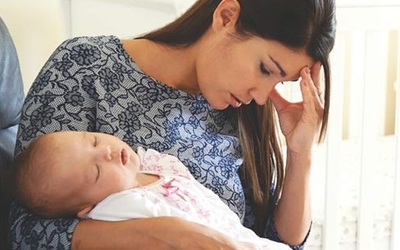“I just became a mother. So why am I feeling down?” You might be asking yourself this exact question. You are always told that being the mother of a baby is one of the best feelings in the world. But is it completely right? Why don’t you feel the same?
[the_ad id=”6287″]
Try not to worry. You aren’t the only person in the world who has succumbed to post-pregnancy depression (PPD). It’s quite common for many mothers, and it is treatable at the same time.
What is post-pregnancy depression?
Post-pregnancy depression AKA postpartum depression is the depression associated with childbirth. Generally, Mothers are affected by PPD, but fathers aren’t completely exempted from it.
Symptoms of PPD
- You feel pretty overwhelmed. You just can’t handle the situation of being a mother
- Crying almost all the time
- Extreme hopelessness
- You face trouble in falling asleep
- Trouble in staying awake during the day
- Restlessness
- Suicidal (If you ever feel this way, do contact a therapist or someone you trust right away)
- You become irritable and unpredictable
- Total lack of interest in doing things that you used to love
- Anger
Duration and Onset of PPD
PPD usually occurs between 2 weeks to a month after a successful delivery. PPD might also kick-start prior to the delivery when the patient starts questioning her decision of being a parent.
PPD can last for several months, but it can be cured in lesser time than that depending upon the patient and the treatment.
Who does PPD affect?
PPD can affect any parent. Although it is more common among mothers, but it can also affect fathers at the same time.
Another point to be noted is that PPD can also affect parents who have adopted a baby.
What are the causes of post-pregnancy depression?
PPD is believed to occur from a combination of different factors such as:
- Hormonal factors
- Emotional factors
- Environmental factors
- Genetic factors
The vital role is played by hormonal changes that include the likes of:
-
- Estrogen
- Thyroid hormone
- Progesterone
- Testosterone
- Cortisol
- Corticotropin-releasing hormone
Does post-pregnancy depression affect the baby?
Yes, it can. You’ll observe several symptoms like these in the baby:
- Increased delay in developing language
- Mother-child bonding issues
- Increased crying
- Behavioral problems
How to cope up with PPD?
If you are certain of this fact that you are suffering from PPD, you can do several things to cope up with the same:
- Don’t go too hard on yourself
- Don’t ask yourself to do many things within a short time. Take a single step at a time, and you’ll see that you’ll breeze through your troubles
- Share your feelings with others. Do not isolate yourself. Isolation can make matters worse
- Go for a walk with your baby. Fresh air can work wonders
- Take enough rest
- Eat healthy and sleep well
If you are facing trouble to keep things under control, do not hesitate to ask for professional help. You are definitely not alone.
How is post-pregnancy depression treated?
PPD is treated more or less in the same manner as depression. These are mainly:
- Talk therapy: AKA psychotherapy or counseling. The patient will talk to a therapist and learn about the different ways through which s/he can cope up with PPD. Talk therapy can also happen in groups
- Medicine: To be more specific, antidepressants are used to treat PPD. Antidepressants help to regulate your mood by balancing chemicals in your brain. You’ll start feeling better after 3 to 4 weeks.
Is it absolutely safe to consume antidepressants during breastfeeding?
It is considered safe. Doctors do not advise mothers to stop taking their medication(antidepressants) during breastfeeding because that would not risk the baby’s health. Instead, the concerned mothers will be putting their health at risk.
What happens if PPD goes untreated?
Untreated PPD might be a real issue. Post-pregnancy depression is a part of the solution, but untreated PPD quickly becomes a part of the problem. Untreated PPD can be quite lonely and scary at the same time. Your condition worsens with time. Proper treatment is therefore recommended from the start so that you do not have to venture into that dark hole which is a very unpleasant place to live.
Post pregnancy depression should never be seen as a part of the problem. Rather it should be seen as a part of the solution. And you’ll see that you have got past it in no time. Always remember that you are a warrior. Keep fighting. Keep on fighting.
Source:

